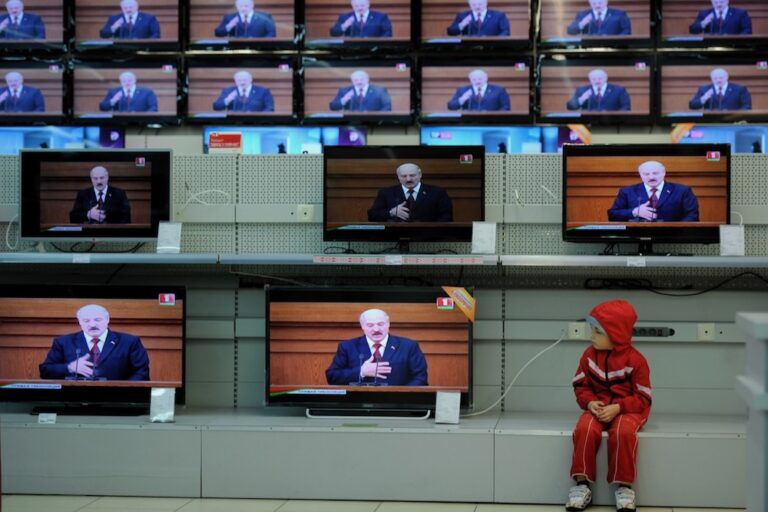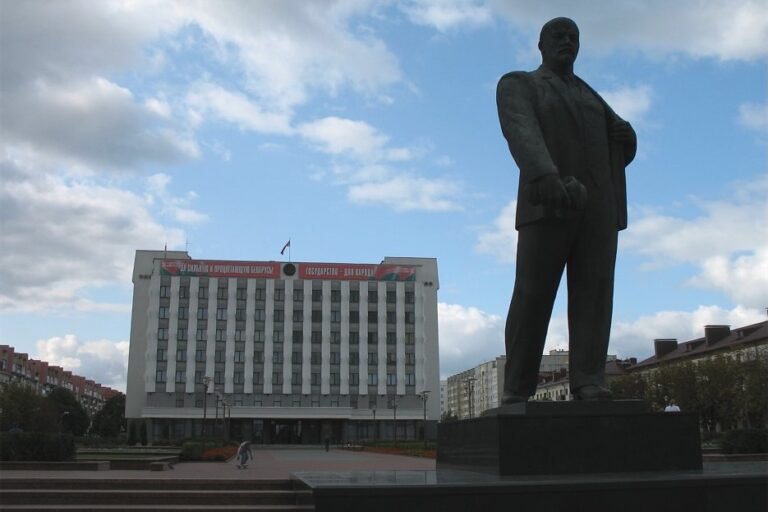(RSF/IFEX) – RSF has denounced a KGB raid of the offices of the independent weekly “Den”, on 11 May 2004. The newspaper, which has been the target of government harassment for several months, also had several of its computers seized. The three-hour raid on the newspaper’s offices was conducted on the orders of Vladimir Onisko, […]
(RSF/IFEX) – RSF has denounced a KGB raid of the offices of the independent weekly “Den”, on 11 May 2004. The newspaper, which has been the target of government harassment for several months, also had several of its computers seized.
The three-hour raid on the newspaper’s offices was conducted on the orders of Vladimir Onisko, deputy prosecutor for the Grodno region, near the Polish border. The paper was suspected of being involved in the publication of leaflets seen as “discrediting” President Alexander Lukashenko.
In a letter to Interior Minister Vladimir Naumov, RSF expressed its indignation, saying, “We are outraged by the methods deployed by the authorities, particularly the KGB, to prevent journalists at ‘Den’ from practicing their profession. We urge you to put an end to this unacceptable harassment and to ensure the return of the computer equipment seized during this search.”
“Den” editor-in-chief Mikolai Markevich told RSF that the newspaper had nothing to do with the publication of the offending leaflets and that the search was just the latest move in a campaign by the authorities against independent media and non-governmental organisations in the run-up to legislative elections in autumn 2004.
The search comes only days before the 15 May deadline set by the housing administrative office in Grodno, for Batskaushchina, the organisation renting the office space to “Den”, to evict its tenants. It has accused the organisation of illegally subletting its office to the newspaper. Markevich pointed out that the administration has repeatedly denied him the right to set up the paper’s office in Grodno.
“Den” has been the focus of an escalating campaign of obstruction over the last several months, including abrupt confiscations, multiple audits and the refusal of local printing companies to work with the newspaper.
On 7 April, police seized 4,800 copies of “Den” at Ivye, approximately 130 kilometres from Grodno. The copies were on their way to Belarus from the printers in Smolensk, Russia. The seized issue carried an article critical of the police’s refusal to charge two men who were arrested on 18 March while attempting to break into the Batskaushchyna offices. Markevich recognised one of the men as a KGB officer. On 17 April, “Den” received a letter from the Regional Prosecutor’s Office confirming that the two men were in fact KGB officers.
In November 2003, the Svetach printer in Minsk illegally broke its contract with the newspaper. Two months later, Belsayuzdruk, the paper’s distributor, followed suit, forcing “Den” to move its operations to neighbouring Russia.
On 15 August 2002, Markevich, then editor-in-chief of the weekly “Pagonya”, was sentenced to 18 months of hard labour for authorising the publication of articles alleging the president’s involvement in the disappearance of political opponents. Pavel Mazheiko, a journalist with the newspaper, was sentenced to one year of hard labour for having “insulted” the president. “Pagonya” had been shut down in November 2001 (see IFEX alerts of 30 and 27 May, 25 and 7 March 2003, 16 September and 13 August 2002 and others).
In its 2004 annual report, RSF denounced the bureaucratic harassment of the independent press in Belarus, which is regarded by the authorities as overly-critical of the ruling party. RSF has named the country as one of the 37 “international press freedom predators”.
In 2003, government authorities suspended or repeatedly penalised more than 10 newspapers, obstructed news production of another 15 independent media outlets, and shut down several human rights organisations that had been supplying them with information.


